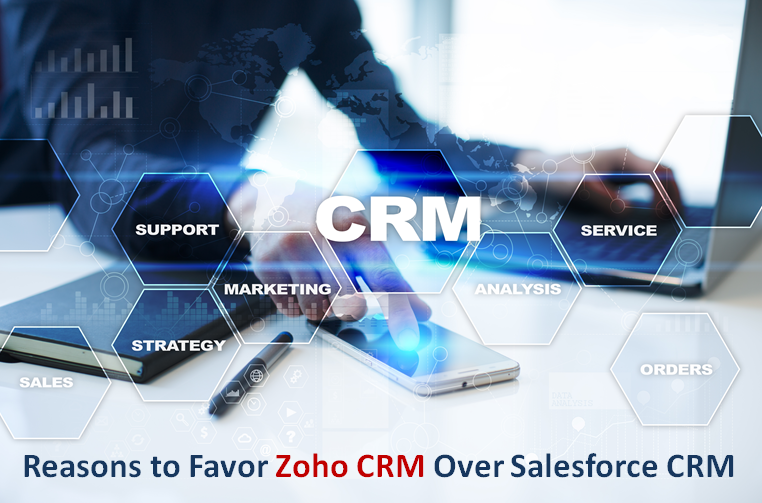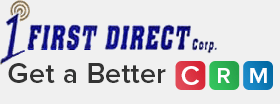One cannot start looking for a CRM solution without running into Salesforce.com It is fair to say that they are one of the biggest competitors in the space. This is not to say they are the best solution or the best value. It is true that they spend a fortune on customer acquisition (marketing & sales) and that it has worked for them. But millions of companies have done themselves a favor and didn’t stop at Salesforce in their search for the best CRM value in the marketplace. And, those that have dug a little deeper have been rewarded with finding Zoho!
FEATURES – For the most part, many of the CRM applications available have overlapping features. It’s certainly true for Salesforce and Zoho. Both Salesforce and Zoho CRM are robust systems full of dynamic and amazing features. Although the basic CRM functionalities such as lead management, account management are similar but there are additional features or depth of features which make them different from each other.
| Categories | Salesforce Sales Cloud | Zoho CRM |
| Web-to-Lead | If there is a “Contact Us” form on your website to catch enquiries, Salesforce automatically creates a lead record from this form. | It captures the information of the visitor directly and assign the lead directly to sales rep along with assignment rules. |
| Branded Email Templates and Insights | It has the stack of pre scripted templates for general and frequent communications. Keep track of when the email was received and opened. | Similar functionality like that provided by Salesforce. But the template analytics track open rate, click rate, the bounce rate of the emails. |
| Outlook | Emails sent from your email clients, like Outlook, Gmail, etc, can be directly synced to Salesforce via plugins. | Similar plugins are available for directly syncing emails from Outlook and other email clients to Zoho CRM |
| SalesInBox | Enter new opportunities right from the inbox, share calendar directly with customers to schedule a time | Your emails are automatically organized and prioritized based on your sales pipeline and stage, thus allowing you to focus more on the deals likely to bring in revenue. |
| Importing and Exporting Data | The Data Import Wizard helps in importing up to 50,000 records at a time. | Data can be transferred from and to Zoho CRM. |
From the above mentioned features, it is very much clear that the features provided by both the CRMs are similar, but in some cases, it is clear that Zoho CRM provides indepth default offerings.
In this blog article I’d like to highlight some key reasons to choose Zoho.
PRICING – Pricing is one of the key points why many organizations opt Zoho CRM instead of Salesforce. Know Why:
Zoho CRM – Zoho CRM is available in four versions namely Standard, Professional, Enterprise and Ultimate. The price range starts from $12 to $100, charged per user/month billed annually. The most popular plan is the Enterprise Plan, priced at $35/user/month billed annually.
Salesforce Sales Cloud – Salesforce Sales Cloud also has four editions SalesforceIQ Starter, Lightning Professional, Lightning Enterprise and Lightning Unlimited. The price range starts from $25 to $300, billed annually for per user/month. Their Enterprise Edition priced at $150/user/month (billed annually) is the most preferred and have the maximum number of subscribers.
Pricing bottom line: Pay less and get more with Zoho.
MARKETPLACE & INTEGRATION WITH APPS – Both Salesforce and Zoho have a community of integrations built for them by third-parties. Marketplace offers a host of integrations for 3rd party apps. With the help of Zoho Developer, you can create custom extensions and applications. You can also add more feature to your CRM via native integration with Zoho’s Business Suite – Zoho Campaigns, Zoho Projects, Zoho Support, Zoho Survey, Zoho Reports, Zoho Invoice and others. Zoho can also be integrated with Google Apps to perform functions such as syncing tasks to Google calendar, attaching files to Google drive to name a few.
Again, there are many similarities in terms of the types of add-on solutions available to each CRM. So let’s look at reasons to choose Zoho.
EASY TO USE – Zoho’s modular approach, and clean layout makes it easier to use and configure in our opinion. The current Zoho CRM UI is easily navigable, and you can effortlessly filter your data on the basis of potential amount, stage, closing date, country and numerous other features. In short, it feels like Zoho has done their proper research on how Sales Reps need to view their data. Thus making the learning curve is much simpler, so it is easy to get a hang of the CRM quickly.
On the other hand, we do not believe the default UI of Salesforce is competitively as user friendly. Salesforce seems somewhat harder to navigate and a bit complex for a newbie.
Zoho’s approach should lead to faster and easier adoption.
CONTACT MANAGEMENT – Contact management is one of the most important components of any CRM. Both platforms feature platforms for adding and managing contacts, as well as leads, accounts and business opportunities.
The Salesforce database stores customer data, communication history, related activities for every contact. It also enables you to access social data from most major platforms to have an in depth detail of the customer. If leads have been generated from marketing campaigns, you can keep track of their activity in real time and move them seamlessly into your sales pipeline.
Zoho’s contact management features won’t disappoint, either. Since Zoho integrates with most major office applications, you can keep the record of phone numbers, to-do lists and other things without leaving the system. Use the Zoho Import Wizard, Web Forms, or the Zoho CRM API to easily import contacts. A built-in social CRM feature pulls data from Google+, Facebook, and Twitter and allows you to keep track of social conversations.
CONTRACT – Here’s where the comparison truly ends – in Zoho’s favor! Whereas Salesforce locks customers into long and expensive contracts, Zoho has a flexible and no contract pricing model. You can purchase Zoho license on monthly basis and any time you feel like, you can terminate the services without any hassle or termination fee. If you make license payment annually, Zoho offers discounted fee depending on your business and growth. You can also upgrade and downgrade your plan anytime.
On the other hand with Salesforce, you need to have annual contracts. So being the customer, you know exactly what you have paid now and what you will have to pay in the future if you happen to opt for a multi-year contract. It has also been reported that termination of contract poses some hiccups and termination fee is also charged. Contact the Salesforce person to guide you through the same.
CUSTOMER SUPPORT AND TRAINING – There is a dedicated support portal of Zoho which features user guides, developer guides, videos, forums. All in all a complete knowledge stack along with community support, email support. Technical support is included in the monthly license fee and is available 24*7.
Even Salesforce has dedicated support portal just like Zoho CRM with access to videos and FAQs. But there is one big drawback – With Salesforce, toll free support is ONLY already included in License cost for the Unlimited edition.
BOTTOM LINE –All those looking for a user-friendly, but highly advanced CRM solution that has plenty of room to scale, at an affordable price, without a long-term contractual obligation will find they GET A BETTER CRM with Zoho. To plan your salesforce escape or if you have decided to migrate from Salesforce to Zoho CRM, speak to the experts at First Direct Corp. today!






